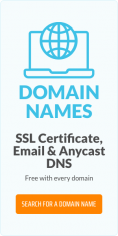5 Most Common Domain Name Myths

Tthere are many misconceptions about domain extensions. These can lead to costly mistakes, missed opportunities, and even damage to your brand. In this article, we'll debunk five common misconceptions about domain extensions and provide clear, actionable advice to help you make the best choice.
Misconception 1: .com is the Only Credible Domain Extension for Businesses
Think a .com is the only way to look professional online? That’s one of the oldest myths in the domain book. While .com is undeniably popular, it’s far from your only option. Today, businesses are thriving with alternatives like .net, .org, and niche extensions like .tech, .shop, or even country-specific domains. These options aren’t second best—they’re strategic choices that can reflect your brand’s personality, purpose, or location more effectively than a generic .com ever could.
Choosing the right domain extension is less about defaulting to convention and more about standing out. Want a name that’s actually available? Looking for something that speaks directly to your industry or audience? Non-.com domains can offer better availability, clearer messaging, and sometimes even lower costs. In the end, trust isn’t built by your extension—it’s built by what you do with it. So go ahead—explore beyond .com and find a domain that truly fits your brand.

Misconception 2: Domain Extensions Have No Impact on SEO
Let’s bust another myth: your domain extension doesn’t matter for SEO. Actually—it can. While it’s true that Google prioritizes quality content, fast load times, and great user experience, your domain extension still plays a subtle but real role. It’s part of the first impression—for users and search engines. A location-specific extension like .de or .co.uk can signal local relevance, helping you connect with regional audiences more effectively. Similarly, industry-focused domains like .tech or .studio can give both users and algorithms context about what you do before they even click.
That said, your extension won’t carry your SEO on its own. It’s more like the cherry on top of a well-optimized site. Your real ranking power comes from useful content, mobile-first design, intuitive navigation, and smart internal linking. But when chosen with intention, your domain extension can reinforce trust, improve click-through rates, and support your broader SEO goals. So yes—domain extensions matter. Use them wisely.
Misconception 3: Newer Domain Extensions are Less Secure
Worried that newer domain extensions are less secure than good old .com? That’s a myth worth ditching. Your domain ending—whether it’s .tech, .store, or .xyz—doesn’t make your site vulnerable. What does matter? The way you build and maintain your site. Security starts with choosing a solid hosting provider, keeping your software updated, using HTTPS, and locking down those passwords.
New extensions aren’t the risk—bad habits are. You can absolutely stay innovative with your domain choice and keep things locked tight. Focus on cybersecurity best practices, not outdated assumptions. Because in the end, it’s not about what’s at the end of your URL—it’s about how well you protect everything behind it.

Misconception 4: Domain Extensions are Irrelevant to Branding
Misconception 5: Changing Your Domain Extension Will Always Negatively Impact Your Traffic
Worried that changing your domain extension will tank your traffic? It’s a valid fear—but not a guaranteed outcome. In fact, switching to a more relevant extension can boost visibility, sharpen your branding, and make your site easier to remember. The key? Do it smart. Set up proper redirects from your old domain, update your marketing materials, and give your audience a heads-up. When handled with care, a domain switch isn’t a setback—it’s a strategic upgrade.

Choosing the right domain extension isn’t just a technical decision—it’s a branding move. Whether you’re targeting a specific region, industry, or vibe, the right extension helps your audience get who you are faster. Take time to align your extension with your mission, message, and market—and you won’t just preserve your online presence, you’ll elevate it.
